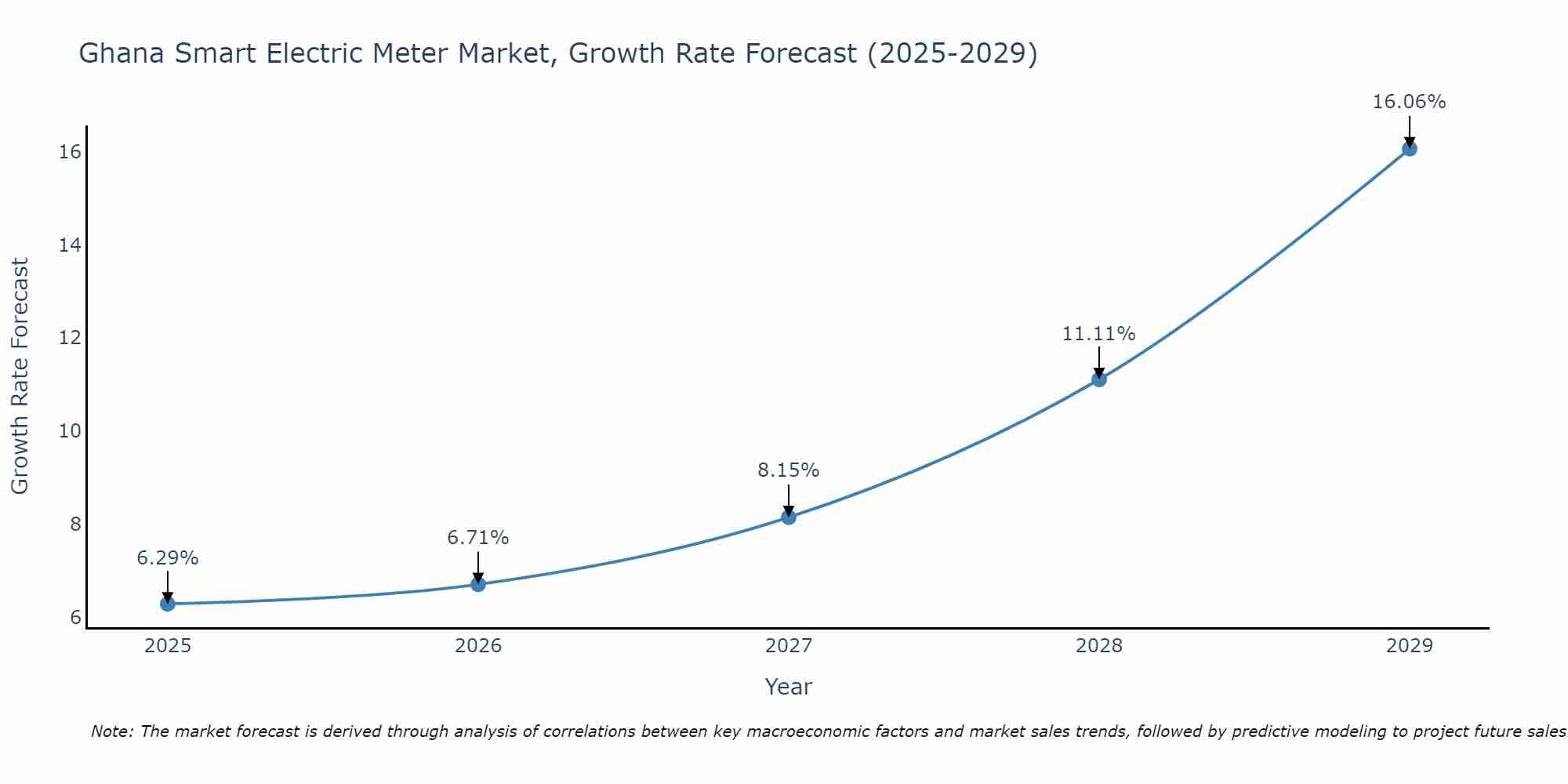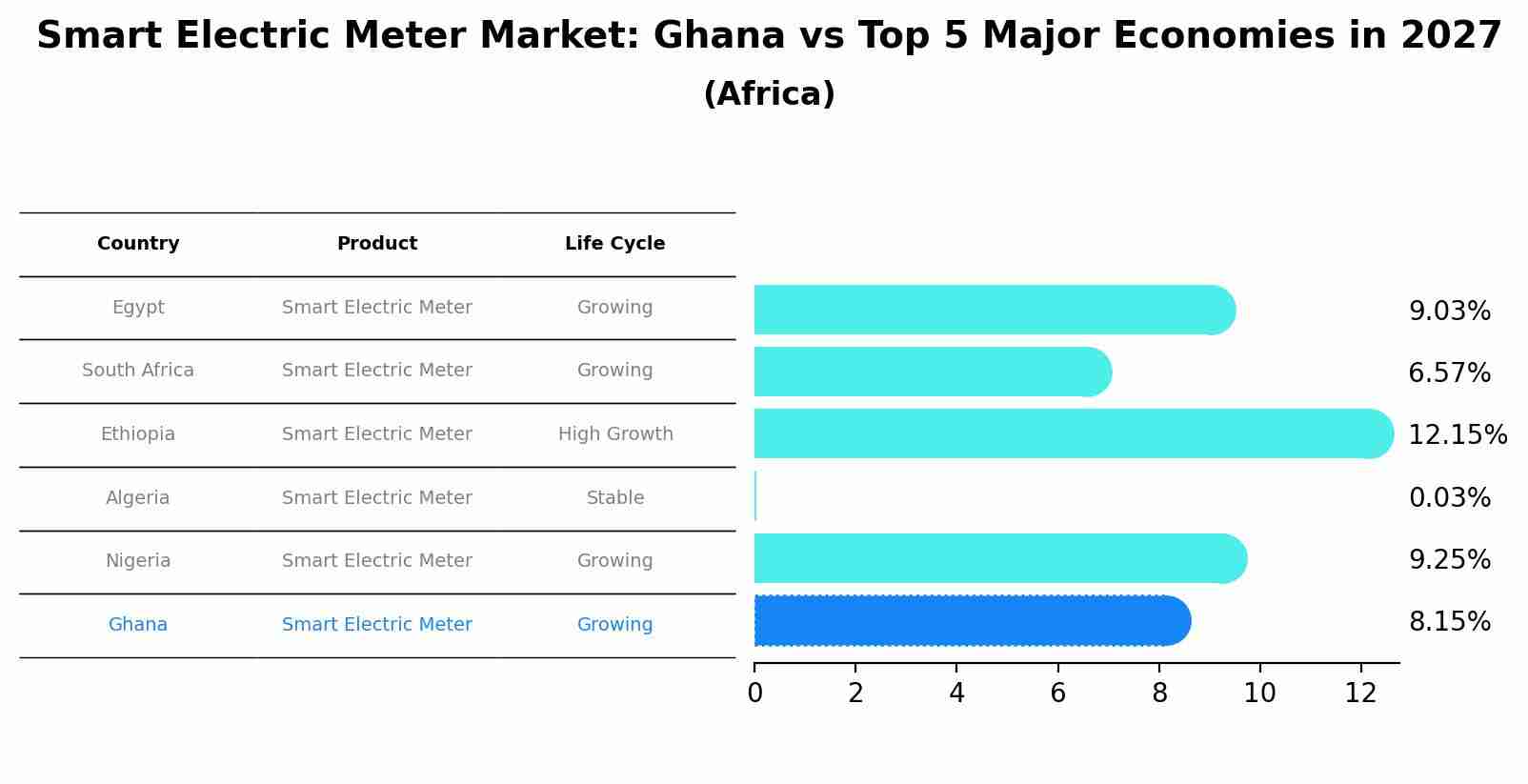Ghana Smart Electric Meter Market (2025-2031) Outlook | Size, Growth, Revenue, Share, Analysis, Forecast, Trends, Value, Companies & Industry
| Product Code: ETC369356 | Publication Date: Aug 2022 | Updated Date: Jul 2025 | Product Type: Market Research Report | |
| Publisher: 6Wresearch | Author: Dhaval Chaurasia | No. of Pages: 75 | No. of Figures: 35 | No. of Tables: 20 |
Ghana Smart Electric Meter Market Size Growth Rate
The Ghana Smart Electric Meter Market is likely to experience consistent growth rate gains over the period 2025 to 2029. The growth rate starts at 6.29% in 2025 and reaches 16.06% by 2029.

Smart Electric Meter Market: Ghana vs Top 5 Major Economies in 2027 (Africa)
The Smart Electric Meter market in Ghana is projected to grow at a growing growth rate of 8.15% by 2027, highlighting the country's increasing focus on advanced technologies within the Africa region, where Egypt holds the dominant position, followed closely by South Africa, Ethiopia, Algeria and Nigeria, shaping overall regional demand.

Ghana Smart Electric Meter Market Synopsis
The Ghana Smart Electric Meter Market is experiencing significant growth driven by government initiatives to improve electricity access and reduce losses in the distribution network. Smart meters offer advanced functionalities such as real-time monitoring, remote reading, and load control, enabling utilities to optimize energy consumption and improve efficiency. The market is characterized by increasing adoption of smart grid technologies, rising urbanization, and growing awareness of energy conservation. Key players in the market include ABB, Itron Inc., and Siemens AG, offering a range of smart meter solutions to meet the varying needs of residential, commercial, and industrial customers. The market is poised for further expansion as utilities seek to modernize their infrastructure and consumers demand more control over their energy usage.
Ghana Smart Electric Meter Market Trends
The Ghana Smart Electric Meter Market is experiencing a growing demand for advanced metering infrastructure (AMI) solutions driven by the government`s efforts to improve energy efficiency and reduce non-technical losses. Key trends in the market include the adoption of prepaid smart meters for better revenue collection, integration of IoT technology for real-time data monitoring, and the shift towards digitalization for improved grid management. Increasing investments in renewable energy projects and the expansion of urban areas are also contributing to the market growth. Smart meter vendors are focusing on offering innovative solutions tailored to the Ghanaian market`s specific needs, such as remote monitoring capabilities and mobile payment options, to capitalize on the evolving landscape of the smart electric meter market in Ghana.
Ghana Smart Electric Meter Market Challenges
In the Ghana Smart Electric Meter Market, some key challenges include high initial costs of deploying smart meters, limited financial resources for utilities to invest in advanced metering infrastructure, inadequate technical expertise for installation and maintenance, as well as the need for robust cybersecurity measures to protect data privacy. Additionally, inconsistent government policies and regulatory frameworks can hinder the widespread adoption of smart electric meters. Furthermore, issues related to consumer awareness and acceptance, such as lack of education on the benefits of smart meters and resistance to change from traditional metering systems, pose challenges in the market. Overcoming these obstacles will require collaboration among stakeholders to address financial, technical, regulatory, and educational barriers to foster the successful implementation of smart electric meters in Ghana.
Ghana Smart Electric Meter Market Investment Opportunities
The Ghana Smart Electric Meter Market presents promising investment opportunities driven by the government`s push towards modernizing the country`s electricity infrastructure. With increasing urbanization and industrialization, there is a growing demand for efficient energy management solutions. Investors can capitalize on this trend by investing in smart metering technology providers, installation services, and data analytics companies. The market offers potential for revenue growth through long-term contracts with utility companies, as well as opportunities for innovation and differentiation in a relatively nascent market. Additionally, the government`s initiatives to improve energy efficiency and reduce electricity theft further bolster the attractiveness of investing in the Ghana Smart Electric Meter Market.
Jordan Agar Market Government Policies
The Ghanaian government has implemented several key policies related to the Smart Electric Meter Market to drive the adoption of this technology. These policies include the Smart Grid Policy Framework, which aims to modernize the electricity distribution network through the deployment of smart meters. Additionally, the government has introduced the National Electrification Scheme, which prioritizes the use of smart meters in rural and underserved areas to improve energy access and efficiency. Furthermore, the Ghana Energy Commission Act mandates the use of smart meters for all utility customers to promote effective energy management and reduce losses in the electricity sector. Overall, these policies demonstrate the government`s commitment to promoting the widespread use of smart electric meters for a more sustainable and efficient energy sector in Ghana.
Ghana Smart Electric Meter Market Future Outlook
The Ghana Smart Electric Meter Market is poised for significant growth in the coming years due to increasing government initiatives towards modernizing the energy sector and improving electricity access. The adoption of smart meters in Ghana is expected to rise as utility companies seek to enhance operational efficiency, reduce energy losses, and empower consumers with real-time consumption data. Additionally, factors such as the growing urbanization, rising electricity demand, and the focus on renewable energy integration will drive the demand for smart electric meters in the country. With advancements in technology and a push towards smart grid infrastructure, the Ghana Smart Electric Meter Market is forecasted to experience steady growth and attract investments from both local and international players in the near future.
Key Highlights of the Report:
- Ghana Smart Electric Meter Market Outlook
- Market Size of Ghana Smart Electric Meter Market, 2024
- Forecast of Ghana Smart Electric Meter Market, 2031
- Historical Data and Forecast of Ghana Smart Electric Meter Revenues & Volume for the Period 2021 - 2031
- Ghana Smart Electric Meter Market Trend Evolution
- Ghana Smart Electric Meter Market Drivers and Challenges
- Ghana Smart Electric Meter Price Trends
- Ghana Smart Electric Meter Porter's Five Forces
- Ghana Smart Electric Meter Industry Life Cycle
- Historical Data and Forecast of Ghana Smart Electric Meter Market Revenues & Volume By Phase for the Period 2021 - 2031
- Historical Data and Forecast of Ghana Smart Electric Meter Market Revenues & Volume By Single for the Period 2021 - 2031
- Historical Data and Forecast of Ghana Smart Electric Meter Market Revenues & Volume By Three for the Period 2021 - 2031
- Historical Data and Forecast of Ghana Smart Electric Meter Market Revenues & Volume By Communication Technology Type for the Period 2021 - 2031
- Historical Data and Forecast of Ghana Smart Electric Meter Market Revenues & Volume By Power Line Communication (PLC) for the Period 2021 - 2031
- Historical Data and Forecast of Ghana Smart Electric Meter Market Revenues & Volume By Radio Frequency (RF) for the Period 2021 - 2031
- Historical Data and Forecast of Ghana Smart Electric Meter Market Revenues & Volume By Cellular for the Period 2021 - 2031
- Historical Data and Forecast of Ghana Smart Electric Meter Market Revenues & Volume By End-Users for the Period 2021 - 2031
- Historical Data and Forecast of Ghana Smart Electric Meter Market Revenues & Volume By Industrial for the Period 2021 - 2031
- Historical Data and Forecast of Ghana Smart Electric Meter Market Revenues & Volume By Commercial for the Period 2021 - 2031
- Historical Data and Forecast of Ghana Smart Electric Meter Market Revenues & Volume By Residential for the Period 2021 - 2031
- Ghana Smart Electric Meter Import Export Trade Statistics
- Market Opportunity Assessment By Phase
- Market Opportunity Assessment By Communication Technology Type
- Market Opportunity Assessment By End-Users
- Ghana Smart Electric Meter Top Companies Market Share
- Ghana Smart Electric Meter Competitive Benchmarking By Technical and Operational Parameters
- Ghana Smart Electric Meter Company Profiles
- Ghana Smart Electric Meter Key Strategic Recommendations
Frequently Asked Questions About the Market Study (FAQs):
- Single User License$ 1,995
- Department License$ 2,400
- Site License$ 3,120
- Global License$ 3,795
Search
Thought Leadership and Analyst Meet
Our Clients
Related Reports
- Canada Oil and Gas Market (2026-2032) | Share, Segmentation, Value, Industry, Trends, Forecast, Analysis, Size & Revenue, Growth, Competitive Landscape, Outlook, Companies
- Germany Breakfast Food Market (2026-2032) | Industry, Share, Growth, Size, Companies, Value, Analysis, Revenue, Trends, Forecast & Outlook
- Australia Briquette Market (2025-2031) | Growth, Size, Revenue, Forecast, Analysis, Trends, Value, Share, Industry & Companies
- Vietnam System Integrator Market (2025-2031) | Size, Companies, Analysis, Industry, Value, Forecast, Growth, Trends, Revenue & Share
- ASEAN and Thailand Brain Health Supplements Market (2025-2031) | Strategy, Consumer Insights, Analysis, Investment Trends, Opportunities, Growth, Size, Share, Industry, Revenue, Segments, Value, Segmentation, Supply, Forecast, Restraints, Outlook, Competition, Drivers, Trends, Demand, Pricing Analysis, Competitive, Strategic Insights, Companies, Challenges
- ASEAN Bearings Market (2025-2031) | Strategy, Consumer Insights, Analysis, Investment Trends, Opportunities, Growth, Size, Share, Industry, Revenue, Segments, Value, Segmentation, Supply, Forecast, Restraints, Outlook, Competition, Drivers, Trends, Demand, Pricing Analysis, Competitive, Strategic Insights, Companies, Challenges
- Europe Flooring Market (2025-2031) | Outlook, Share, Industry, Trends, Forecast, Companies, Revenue, Size, Analysis, Growth & Value
- Saudi Arabia Manlift Market (2025-2031) | Outlook, Size, Growth, Trends, Companies, Industry, Revenue, Value, Share, Forecast & Analysis
- Uganda Excavator, Crane, and Wheel Loaders Market (2025-2031) | Strategy, Consumer Insights, Analysis, Investment Trends, Opportunities, Growth, Size, Share, Industry, Revenue, Segments, Value, Segmentation, Supply, Forecast, Restraints, Outlook, Competition, Drivers, Trends, Demand, Pricing Analysis, Competitive, Strategic Insights, Companies, Challenges
- Rwanda Excavator, Crane, and Wheel Loaders Market (2025-2031) | Strategy, Consumer Insights, Analysis, Investment Trends, Opportunities, Growth, Size, Share, Industry, Revenue, Segments, Value, Segmentation, Supply, Forecast, Restraints, Outlook, Competition, Drivers, Trends, Demand, Pricing Analysis, Competitive, Strategic Insights, Companies, Challenges
Industry Events and Analyst Meet
Whitepaper
- Middle East & Africa Commercial Security Market Click here to view more.
- Middle East & Africa Fire Safety Systems & Equipment Market Click here to view more.
- GCC Drone Market Click here to view more.
- Middle East Lighting Fixture Market Click here to view more.
- GCC Physical & Perimeter Security Market Click here to view more.
6WResearch In News
- Doha a strategic location for EV manufacturing hub: IPA Qatar
- Demand for luxury TVs surging in the GCC, says Samsung
- Empowering Growth: The Thriving Journey of Bangladesh’s Cable Industry
- Demand for luxury TVs surging in the GCC, says Samsung
- Video call with a traditional healer? Once unthinkable, it’s now common in South Africa
- Intelligent Buildings To Smooth GCC’s Path To Net Zero


















